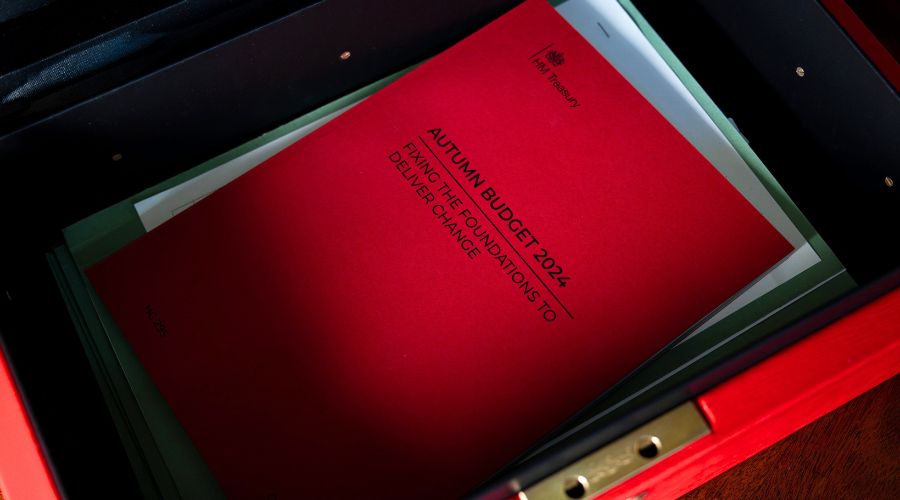Farmers may face ‘one obstacle too many’ following Ag Budget announcement
30th October 2024
Farming organisations have responded to the Autumn Budget 2024 that was announced earlier today by Chancellor Rachel Reeves, explaining how it will influence farmers and their businesses.

As part of the Autumn Budget, the government has announced the farming budget will remain at £2.4 billion for 2025/26.
David Eudall, AHDB economics & analysis director, pointed out that while the funding pot for agriculture in the UK has remained constant since the 2019-24 parliament, the inflation has led to a 44% increase in farm costs over those years.

Mr Eudall said: “We are at a tipping point of how effective this budget can be in meeting the desired outcome of balancing food security, supporting farm efficiency, and delivering environmental benefits given the inflationary pressures we see.”
Country Land and Business Association (CLA) president Victoria Vyvyan added: “The government was elected on a promise of growth, but has done nothing for the countryside but freeze the agriculture budget and raise taxes.
“The decision to freeze the budget at the same level since 2014 – a cut in real terms – will have consequences for hard-pressed farmers, consumers and the environment. It will damage confidence and stability across the industry, risking farm profitability. It could hit sustainable food production and undermine improvements to wildlife habitats, flood management and access to nature.’
READ MORE: Chancellor announces “hammer blow” reforms to agricultural property relief
One obstacle too many
Chancellor Reeves has also revealed significant changes to the inheritance tax for UK farms.
From April 2026, the first £1 million of combined business and agricultural assets will continue to attract no inheritance tax at all, but for assets over £1 million, inheritance tax will apply with 50% relief, at an effective rate of 20%.
David Bean of Countryside Alliance said that the news is very disappointing and may threaten the long-term viability of the family farm.
“Young farmers taking over their parents’ farms already face significant challenges, breaking even. The possibility of facing a 20% inheritance tax bill above the first £1 million in business value at the outset may prove one obstacle too many.”
David Eudall of AHDB added: “The impact of the changes to inheritance tax means that from April 2026, a farm worth £2 million will have a £200,000 tax requirement to pay on the £1 million above the threshold. For every additional £1 million the farm is worth, a further £200,000 will be required to be paid in inheritance tax.”
Relief for already struggling communities
David Bean of Countryside Alliance said that the announcement to keep the fuel duty frozen will offer some relief to already struggling rural communities up and down the country.
The expert explained that hiking fuel duty would only have increased the financial pressure on working people living in rural communities.
However, Mr Bean also said it is “very disappointing” that the government “continues in its intention to restrict eligibility for the Winter Fuel Payment by the means announced in July”.
He added: “Withdrawing a benefit intended to help meet heating costs for all pensioners not qualifying for income-related benefits, without reference to elevated rural heating costs, risks exacerbating the rural premium, that is the added costs of living that residents must pay by virtue of living in a rural area”.
READ MORE: Households may face £1,300 fine for using fireplace
Tax burden is mounting
The Agricultural Industries Confederation (AIC) has previously warned that tax rises announced in today’s Budget would increase burdens on businesses and could fuel food price inflation while deterring investment.

Chancellor Reeves has also announced today that employers’ National Insurance contributions would be increased to 15% and the threshold at which some businesses begin to pay this will be lowered.
AIC warns that this risks stifling productivity in the agricultural supply and wider agribusiness industries, while risking a rise in inflation.
Robert Sheasby, AIC’s chief executive, said: “While AIC welcomes this government’s overarching ambition to drive economic growth throughout the UK, it is concerning to see the tax burden mounting at a time when agricultural supply businesses need the confidence to invest in infrastructure, technologies and systems to boost productivity and enhance sustainability for the future.”
Fundamental changes needed
Nature Friendly Farming Network (NFFN) pointed out that Labour’s commitment to opening applications for the Higher Tier of Countryside Stewardship (CS) early in 2025 from the was “particularly pleasing”.
The farmer-led organisation has also welcomed the move to pay £60 million through the Flood Recovery Fund to farmers affected by extreme weather events last winter.
Martin Lines, NFFN CEO, said: “Currently, the majority of ELMs funding is directed towards the schemes with the lowest ambitions for nature, placing minimal demands on farmers. This must change, with more ambitious schemes receiving sufficient funds to realise their full potential.
“I particularly welcome the move to open up the Higher Tier of CS, as there have been many problems with it and it has caused a lot of worry, especially for upland farmers for whom balancing environmental outcomes and food production is vital.”
However, the NFFN said that the Budget “was not all good news”. The organisation warns that some farm businesses will now have to urgently rethink their plans and could find themselves struggling as the phaseout of land-based payments is quickened, while there is also considerable concern that the government’s changes to agricultural property relief will require careful tax planning and could have a particularly significant impact on family farms.
Mr Lines added: “We urgently need fundamental changes to make our farm businesses financially resilient, enabling farmers to continue producing food amid the climate crisis and protecting our long-term food security. A healthier farming budget will be instrumental in achieving this, but now is not the time for ministers to hold back.”
READ MORE: Farmer welcomes payments for introducing wildlife
Vital role of farmers
Minister for food security and rural affairs Daniel Zeichner said today that farming and food security are the foundations of a “healthy and resilient economy and environment”.
He added: “Our commitment to farmers and the vital role they play to feed our nation remains steadfast.”
Defra minister also confirmed that ELM schemes will remain at the centre of the government’s offer for farmers and nature, with the Sustainable Farming Incentive, Countryside Stewardship Higher Tier and Landscape Recovery all continuing.

“We will also support farmers with the exceptional impact of flooding last winter, paying out £60 million for farmers affected by unprecedented rainfall and flooding through the Farming Recovery Fund.
“Our focus will be on making sure funding is used to the best effect for food, farming and nature, and that our schemes work for farms who have been too often ignored such as small, grassland, upland and tenanted farms.
“We look forward to working with farmers across the country to continue to improve and evolve our schemes and policies, to make them work for farmers and nature,” MP Zeichner concluded.
Read more political news.
